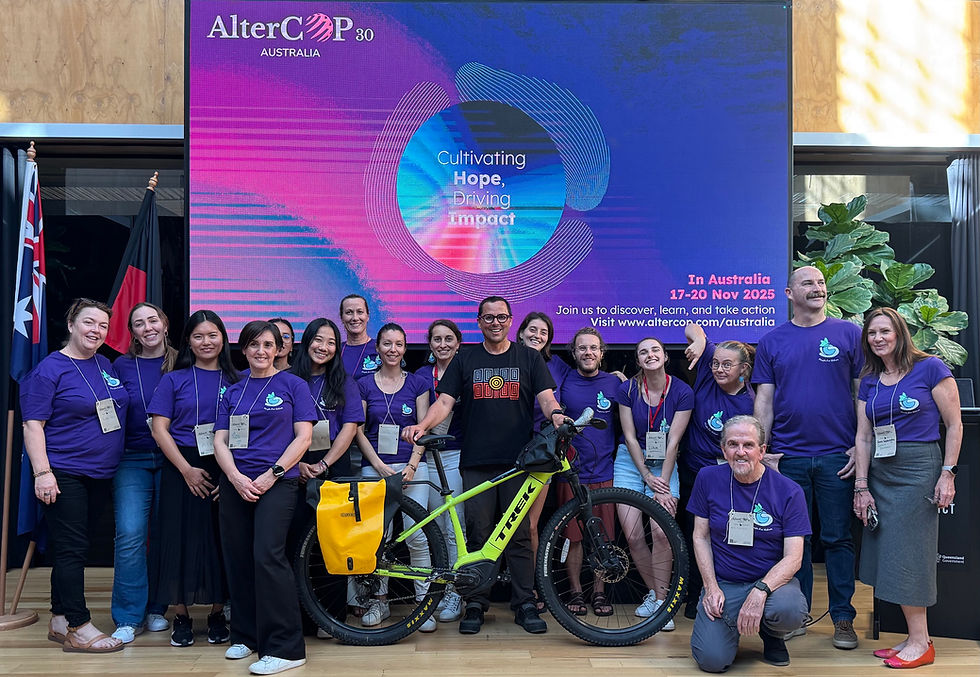“Always Was, Always Will Be”: What It Really Means for Belonging on This Land
- Gregory Andrews

- Nov 21, 2025
- 3 min read
Somewhere between Narrabri and Gilgandra, bumping along a dirt back road on my e-bike, I realised just how far I’d travelled without really moving at all.
On this #eBike4Australia ride I’ve crossed Ngunnawal, Gundungurra, D’harawal, Dharug, Awabakal, Worimi, Birpai, Bundjalung, Gumbaynggirr, Jagera, Kamilaroi, and Wiradjuri Country - and that’s just the short list. Every day begins with a new horizon line, but it’s also the same old truth under my tyres: I am riding on Aboriginal land. Always was. Always will be.
For some non-Aboriginal people, that saying lands like a threat. I hear it in conversations in pubs and roadhouses. “It can't be Aboriginal land, because it's my country too! Some Australians seem to be afraid that it means they don’t belong here. That one day someone will tap them on the shoulder and say, “Hand back the keys.”
I don’t think it helps to just dismiss that fear. We have to look it in the eye and then tell the truth: “Always was, always will be Aboriginal land” isn't a threat of eviction. It’s a statement of reality in a nation that's spent more than 200 years pretending otherwise.
For most of our post-1788 history, the official story was terra nullius – “land belonging to no one”. It was a legal fiction designed to make British sovereignty feel clean and simple - Aboriginal people didn’t exist here at all.
We know it was a lie. We’ve always known. You can’t have more than 250 languages, complex systems of law, trade routes, songlines, kinship rules and deep spiritual relationships to Country and still call the place empty. But terra nullius did more than justify invasion. It seeped into Australia's national psyche. It shaped maps, property titles, school books and the way many Australians still talk about “settling” or “opening up” the land, as if nobody was here living full and rich lives here beforehand.
Mabo overturned terra nullius in the High Court three decades ago, but the old story still lingers. We've never had treaties like Aotearoa/New Zealand, Canada and the US. We’ve never gone through a formal decolonisation process like many countries in Africa and Asia when the British and French packed up and left. Here, the colonising power stayed and morphed into us. We inherited the Crown’s claims and kept going.
In that context, “Always was, always will be Aboriginal land” is doing the work that constitutions, treaties and truth commissions have done elsewhere. It's a flag planted in the cultural ground, saying: there were First Peoples here before the British arrived; they are still here; their sovereignty and their relationship to Country didn’t magically evaporate just because someone planted the Union Jack here.
So where does that leave non-Aboriginal Australians? Well it doesn't mean they have no place here. I'm not interested in politics of guilt that tells millions of people born on this continent that they aren't legitimate. And it's not what I heard on my #eBike4Australia ride from Aboriginal peoples who consistenly welcomed me onto their Country.
What I hear, over and over, is something more generous: we can all belong here - but not on the old terms. We don’t get to belong on the basis that we “made something from nothing”. We don’t get to belong by erasing the people who were here first, or by treating their survival and sovereignty as a footnote. Belonging has to be based on honest relations with First Nations peoples, on the truth about how we got here, and on the living Country under our feet.
That’s why acknowledgements of Country matter, when they are spoken with meaning rather than mumbled. It’s why land rights and native title and treaties matter. It’s why listening to First Nations leadership on issues from climate to water to cultural heritage isn't just an optional extra. These are all ways non-Aboriginal Australia can live here honestly.
As I’ve pedalled across different Aboriginal Countries on this ride, I’ve sat with what it means to be a guest. Sometimes that's looked like expressing recognition and thanks to a local mob member at a servo or Maccas. Sometimes it’s just been a quiet moment on the side of the road, helmet off, saying thank you to the people and the Country that are letting me pass.
“Always was, always will be Aboriginal land” means you, me and all of us can belong here truthfully. As I ride the last few hundred kilometres towards Canberra, I’m more convinced than ever that Australia won’t find peace or justice by running away from that truth. Our best hope is to grow into it.





Fantastic trip and thank you for your posts. Just what we need - leadership advocating cohesion, unity of purpose of the lives we want for all Australians and their families - and all the wonderful variety that is this country now. Safe tracks home.
You need to ride Adnyamathanha country! Best place on earth
I’ve been loving your blog btw